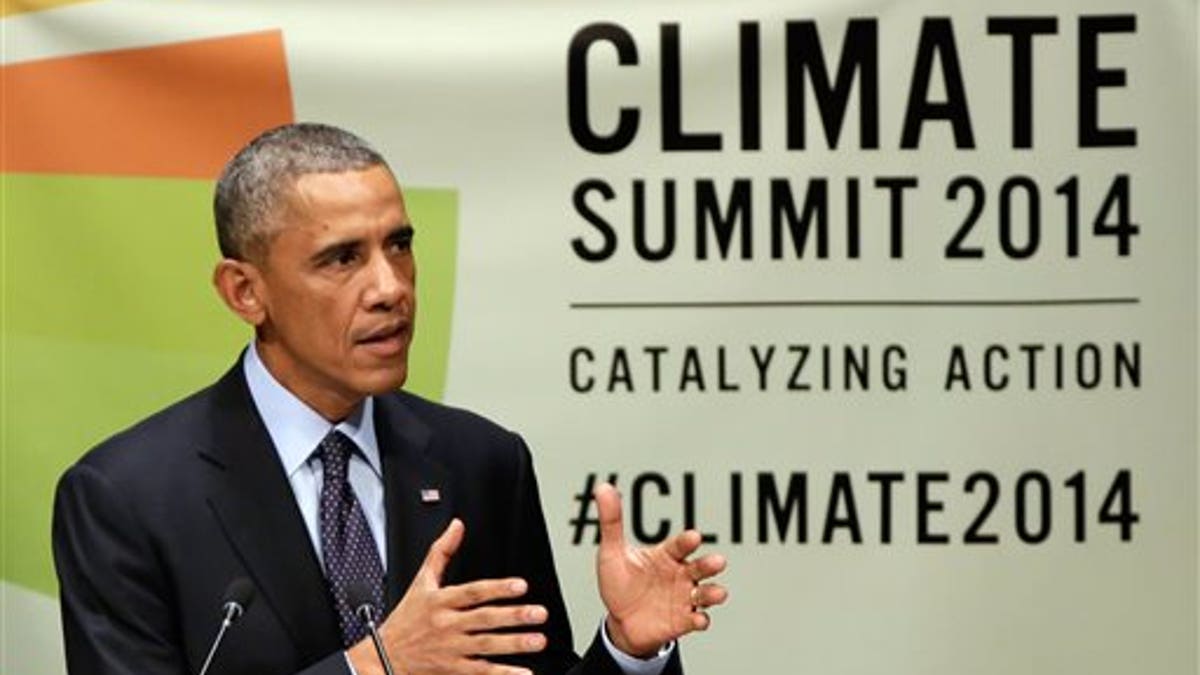
United States President Barack Obama addresses the Climate Summit, at United Nations headquarters, Tuesday, Sept. 23, 2014. (AP Photo/Richard Drew)
At the 2014 United Nations Climate Summit on Tuesday, President Barack Obama offered a stunning -- in fact, deeply disturbing -- insight into his views on threats to the United States and the American people.
According to Obama, “For all the immediate challenges that we gather to address this week -- terrorism, instability, inequality, disease -- there’s one issue that will define the contours of this century more dramatically than any other, and that is the urgent and growing threat of a changing climate.”
You heard him right. Not the threat posed by Islamist extremism to world stability. Not the nuclear programs of Iran and North Korea or the prospect of weapons of mass destruction in the hands of terrorists.
Not Russia’s de facto takeover of Crimea and covert invasion of eastern Ukraine. Not the African Ebola outbreak or the threat of renewed global economic recession.
Of course, this suits the United Nations to a tee. It decided to convene the latest Climate Summit as the headliner to the opening of the 69th session of General Assembly for the same reasons President Obama gave in his speech. According to the Summit’s webpage, “Climate change is not a far-off problem. It is happening now and is having very real consequences on people’s lives. Climate change is disrupting national economies, costing us dearly today and even more tomorrow.”
[pullquote]
If only the climate change chorus hadn’t cried wolf so many times before.
Remember when former Vice President Al Gore warned in 2007 that the Arctic “could be completely gone in the summer in as little as seven years”? Instead, the Arctic ice cap has grown substantially and is more than 40 percent larger than in 2012.
Remember the U.N. Environment Program prediction that climate change would lead to 50 million refugees by 2010? Apparently, UNEP hopes that you don’t, because it quietly scrubbed its website of the prediction when those climate refugees failed to materialize.
How about the warnings of dramatically severe weather? The U.N. World Meteorological Organization released videos of “weather reports from 2050” that predicted dire weather, including a forecast for the U.S. that highlighted temperature spikes, mega-droughts and massive flooding from distant hurricanes.
The wheels have fallen off all of these predictions. As stated by Roger Pielke Jr., an esteemed climate scientist who testified before Congress last July: “It is misleading, and just plain incorrect, to claim that disasters associated with hurricanes, tornadoes, floods, or droughts have increased on climate timescales either in the United States or globally.” And the Wall Street Journal notes there has been a “hiatus in warming that has now lasted for 16, 19 or 26 years depending on the data set and which the climate models failed to predict even as global carbon dioxide emissions have climbed by 25 percent.”
In essence, the U.N. has made a major industry of issuing dire climate change predictions that fail to materialize. And now the man charged with defending America’s security as commander-in-chief echoes those views.
True, the climate has warmed over the past century. But it has not done so according to predictions, so to take major steps based on flawed forecasts is a big gamble.
Obama should heed the advice of Steven Koonin, his former undersecretary for science in the Energy Department: “Any serious discussion of the changing climate must begin by acknowledging not only the scientific certainties but also the uncertainties, especially in projecting the future.”
It would be doubly foolish to take symbolic action that would be costly but have no tangible effect, which is what Obama seems set on.
Developing countries like China and India are among the world’s biggest greenhouse gas sources, but they are, understandably, far more concerned about increasing economic growth and living standards and have resisted calls to commit to emissions reductions. They, along with Russia, sent lower level officials to the Climate Summit where President Obama issued his striking prediction. Even developed countries like Australia, Canada and Germany have implicitly questioned the utility of the summit by sending lower level officials.
Global interest in pursuing a climate change agreement appears to be ebbing despite the best efforts of Obama and the U.N.
One might expect a certain amount of unreality from the U.N., which has a long history of ignoring major crises and fixating on secondary issues. But the American people expect more realistic perspective from their president.
Especially when the world is openly ablaze with dangerous crises of a more conventional and urgent kind.
Brett D. Schaefer is Jay Kingham Senior Research Fellow in International Regulatory Affairs in the Margaret Thatcher Center for Freedom, of the Kathryn and Shelby Cullom Davis Institute for National Security and Foreign Policy, at The Heritage Foundation.
